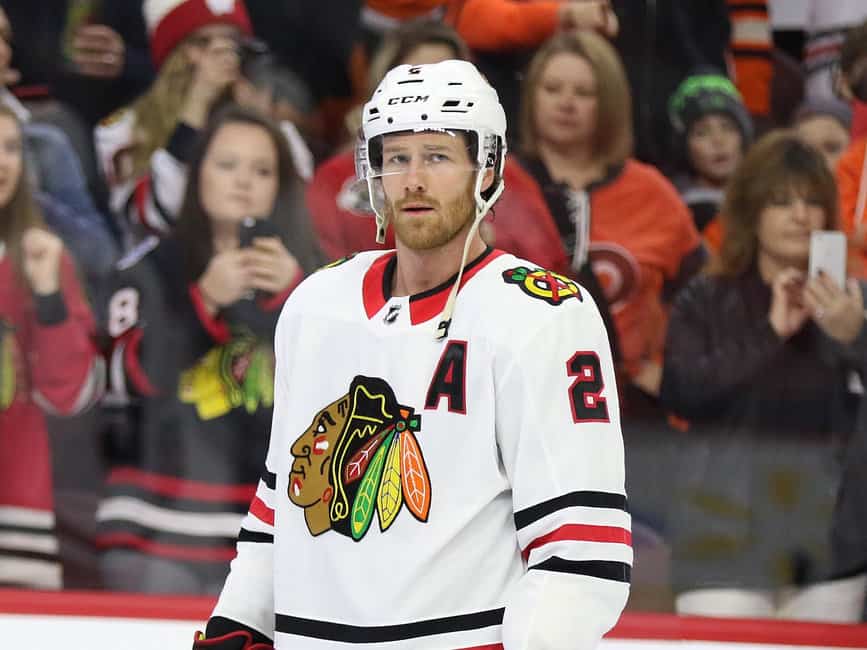** Update: There have been differing thoughts on how this recapture penalty works now. Puck Pedia has updated their thread, also citing an account by Bob Stauffer of Oilers Now that the NHL may no longer enforce these penalties and that the Oilers might not get the benefit of the rule as written in the CBA.
It’s unlikely that Duncan Keith hangs up his skates, but the Edmonton Oilers have asked him to make a decision on his future by July 1. Just the fact that this conversation has been had means there’s some discussion about retirement and should Keith call it a career, the Oilers would find themselves in an interesting salary cap situation. And, to say unique, I mean an extremely positive one.
Keith has been useful. While some won’t argue he was worth the $5.538 million cap hit he ate up this past season, there’s something to be said for how steady he was in a second-pairing role, how he mentored Evan Bouchard, and the level of experience he brought to the team during the postseason. All that said, if you didn’t like his cap hit at the age of 38, you certainly won’t like it at 39 and there are some benefits the Oilers receive if Keith doesn’t return in 2022-23.
How His Cap Hit Works
According to trusted NHL salary cap source Puck Pedia, if Keith retires this summer, his $5.5 million cap hit would be removed from the Oilers’ books. That’s the obvious part. What’s more intriguing is that the Chicago Blackhawks would be forced to eat a salary recapture penalty of $7.5 million. $5.5 million of it would be allocated in 2022-23 and $2 million in 2023-24.
Why this is so interesting for the Oilers is that his new team (Edmonton) would get a cap savings of $3.4 million during the 2022-23 season. In other words, the Oilers would have a negative cap hit should Keith not come back. $3.4 million could do a lot of things, specifically get a combination of Kailer Yamamoto, Ryan McLeod, and Jesse Puljujarvi signed, or get a different defenseman. Maybe that $3.4 million goes towards an Evander Kane extension or finding a new goaltender.
Why Does Edmonton Get the Advantage?
Essentially, because his actual salary is lower than his cap hit — the Oilers paid him $2.1 million but his cap hit was $5.5 million — the opposite of a cap hit for the Oilers takes place. It’s a rule that was put into place when teams were giving out monster-length contracts that were eventually deemed illegal and this is the NHL’s way of negating the cap benefits the teams got when they signed those deals. Think of it as a deferred cap hit. Think of it as Keith having already been paid the money, but the Blackhawks not having been dinged for it. If he retires, the Blackhawks get dinged.

In the end, the Oilers’ cap would wind up with $3.4 million more to spend than other teams, while Chicago would have $3.4 million less. The Blackhawks can afford it, but the Oilers could really use the extra money. And, if Ken Holland knew this going into the deal and was gambling that Keith would retire, he’s a lot smarter than many fans gave him credit for.
Would Keith Actually Retire, Though?
While initial reactions are that Keith would never walk away from $5.5 million, it’s key to remember he won’t be paid $5.5 million next season. He’ll only get his salary of $1.5 million. That’s still a lot of money, but in a career that has spanned 17 seasons, Keith isn’t short on cash. Some fans are suggesting the Oilers offer him a management position to entice him to hang them up. They’d have to be careful not to get caught by the NHL circumventing the cap, but if they do so, they could essentially pay him close to his salary in an executive role while Keith officially calls it quits on the ice.
It’s not incredibly far-fetched to think that Keith might be looking at an executive role in hockey when he retires anyway. This would simply be him getting in early and knowing there’s a job there for him as it would benefit the Oilers to offer one.
Related: 10 Ways Ken Holland Can Improve the Edmonton Oilers
The question becomes about how much he wants to keep playing. The reason he came to Edmonton in the first place was to play hockey near and be closer to his son in Kelowna. He still gets to do that next season on a team that should be competitive. This is a player who keeps himself in incredible shape and is rumored to be hoping to sign another contract when this current one expires. That kind of speculation doesn’t lend well to the idea that this past season was his last. In fact, it suggests the Oilers aren’t just going to pay him his full cap for next season, but potentially sign him to a short-term and cheap contract the following year.
Still, it’s an interesting wrinkle in a deal that a lot of fans didn’t like when the trade took place.
You may also like:
- Oilers’ Skinner in Line for Vezina Trophy Winning Season
- Oilers: 8 GMs Who Would’ve Been Better Hires Than Stan Bowman
- NHL Rumors: Oilers, Maple Leafs, Capitals, Kuznetsov News
- Edmonton Oilers’ Point Projections for 2024-25
- Edmonton Oilers Name Stan Bowman General Manager
